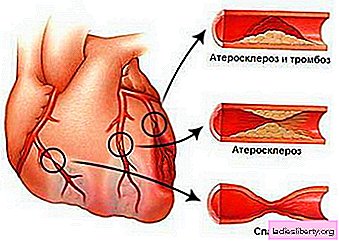
Ischemia represents insufficient blood flow to various organs in the body. This may not be enough caused by a decrease in lumen in the artery.
Ischemia - Causes
It is worth noting that there is a transient and prolonged ischemia. The first type can manifest itself even in a completely healthy person, which is carried out for reasons of physiological regulation of blood supply. This type of ischemia can occur with reflex spasms of the artery, which is provoked by exposure to cold, pain, hormonal disorders and more.
Prolonged ischemia can be caused by biological irritants. It can also occur due to clogging of the artery with a thrombus, with various inflammatory processes, as well as compression of the artery with a scar, foreign body or tumor.
Ischemia can be observed not only in the cardiac arteries. For example, there may be ischemia of the upper and lower extremities, cerebral ischemia.
Ischemia - Symptoms
Symptoms of this disease can manifest themselves in the form of various attacks of pressing and burning chest pain. There may also be a feeling of lack of air, weakness and nausea. Pain can be transmitted to the neck, left arm, or interscapular region.
The very first symptoms of cardiac ischemia are painful sensations. The sooner the big one turns his eyes to such pains, the faster the treatment will go. You can contact a cardiologist for any reason - even with the most minor pains in the region of the heart, especially if they are unknown to the patient. Also, a specialist should be consulted if there is discomfort of a monotonous nature in the chest area.
Somewhere in a third of patients with ischemia, symptoms may not appear at all. As for the rest of the people, the symptoms appear in the form of pain in the arm, in the lower jaw, in the back. Profuse sweating, constant nausea, shortness of breath, change in heart rate - all these are one of the symptoms of ischemia.
Ischemia - Diagnosis
Diagnosis of this disease is developed by assessing the totality of available clinical manifestations, as well as research results. It is rather difficult to recognize the equivalents of angina pectoris and some atypical manifestations of it, when the patient cannot accurately describe the pain.
If ischemia in the region of the heart is characterized by a painless form, then the diagnosis can be made only according to ECG monitoring. A study such as coronarography makes it possible to detect thermosclerotic plaques.
Ischemia - treatment
In order to qualitatively treat ischemia, it is necessary to recreate such conditions so that the compensatory capabilities of the body can develop. In other words, instead of a vessel that has undergone a change, new blood vessels must be developed that are suitable directly to this organ, while they must go around the old vessel. In this case, physiotherapeutic procedures, surgical intervention, as well as some medications are used. To eliminate acute ischemia, special pain medications are introduced.
It is mandatory to check the blood for viscosity, check its anticoagulant and coagulation systems. In the event that any deviations are found, it will be necessary to introduce corrective drugs.
Prevention of ischemia is very necessary for patients. First of all, you need to quit smoking.
For several decades, aspirin (acetylsalicylic acid) has been used to prevent thrombosis and ischemic disease, but prolonged use of it can lead to problems from the gastrointestinal tract, such as heartburn, gastritis, nausea, stomach pain, etc. To reduce the risk of such undesirable consequences, it is necessary to take funds in a special enteric coating. For example, you can use the drug "Thrombo ACC®" *, each tablet of which is coated with an enteric film coating that is resistant to the effects of hydrochloric acid in the stomach and dissolves only in the intestine. This avoids direct contact with the gastric mucosa and reduces the risk of heartburn, ulcers, gastritis, bleeding, etc.
A more intense physical activity is also very important, especially for those people who lead a passive lifestyle. The most important rule is proper nutrition, and the number of calories should completely depend on physical activity.
* There are contraindications, before use it is necessary to consult a specialist











